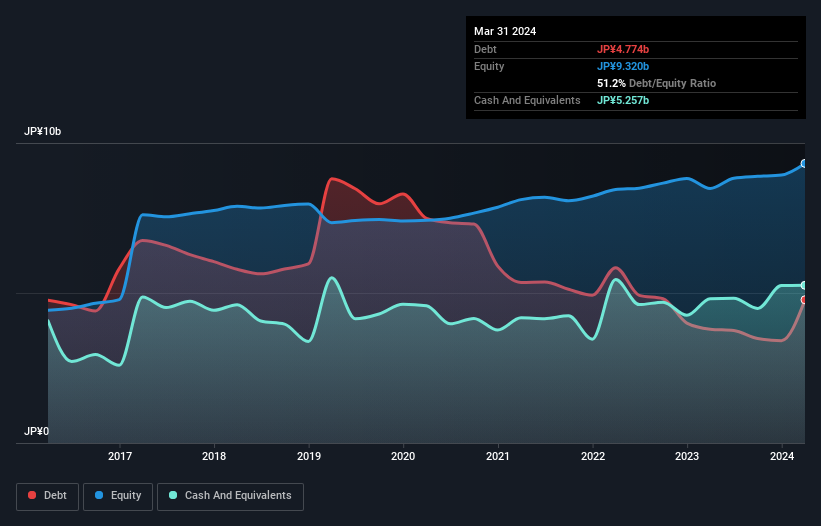The external fund manager backed by Berkshire Hathaway's Charlie Munger, Li Lu, makes no bones about it when he says 'The biggest investment risk is not the volatility of prices, but whether you will suffer a permanent loss of capital.' When we think about how risky a company is, we always like to look at its use of debt, since debt overload can lead to ruin. Importantly, SAKURA Internet Inc. (TSE:3778) does carry debt. But is this debt a concern to shareholders?
When Is Debt Dangerous?
Debt assists a business until the business has trouble paying it off, either with new capital or with free cash flow. If things get really bad, the lenders can take control of the business. However, a more frequent (but still costly) occurrence is where a company must issue shares at bargain-basement prices, permanently diluting shareholders, just to shore up its balance sheet. Of course, plenty of companies use debt to fund growth, without any negative consequences. The first step when considering a company's debt levels is to consider its cash and debt together.
Check out our latest analysis for SAKURA Internet
How Much Debt Does SAKURA Internet Carry?
The image below, which you can click on for greater detail, shows that at March 2024 SAKURA Internet had debt of JP¥4.77b, up from JP¥3.80b in one year. But it also has JP¥5.26b in cash to offset that, meaning it has JP¥483.0m net cash.

How Healthy Is SAKURA Internet's Balance Sheet?
Zooming in on the latest balance sheet data, we can see that SAKURA Internet had liabilities of JP¥10.6b due within 12 months and liabilities of JP¥10.3b due beyond that. On the other hand, it had cash of JP¥5.26b and JP¥3.23b worth of receivables due within a year. So its liabilities outweigh the sum of its cash and (near-term) receivables by JP¥12.4b.
Of course, SAKURA Internet has a market capitalization of JP¥176.8b, so these liabilities are probably manageable. Having said that, it's clear that we should continue to monitor its balance sheet, lest it change for the worse. While it does have liabilities worth noting, SAKURA Internet also has more cash than debt, so we're pretty confident it can manage its debt safely.
The bad news is that SAKURA Internet saw its EBIT decline by 19% over the last year. If that sort of decline is not arrested, then the managing its debt will be harder than selling broccoli flavoured ice-cream for a premium. The balance sheet is clearly the area to focus on when you are analysing debt. But you can't view debt in total isolation; since SAKURA Internet will need earnings to service that debt. So if you're keen to discover more about its earnings, it might be worth checking out this graph of its long term earnings trend.
Finally, a business needs free cash flow to pay off debt; accounting profits just don't cut it. While SAKURA Internet has net cash on its balance sheet, it's still worth taking a look at its ability to convert earnings before interest and tax (EBIT) to free cash flow, to help us understand how quickly it is building (or eroding) that cash balance. Happily for any shareholders, SAKURA Internet actually produced more free cash flow than EBIT over the last three years. That sort of strong cash conversion gets us as excited as the crowd when the beat drops at a Daft Punk concert.
Summing Up
We could understand if investors are concerned about SAKURA Internet's liabilities, but we can be reassured by the fact it has has net cash of JP¥483.0m. And it impressed us with free cash flow of -JP¥734m, being 182% of its EBIT. So we don't have any problem with SAKURA Internet's use of debt. There's no doubt that we learn most about debt from the balance sheet. But ultimately, every company can contain risks that exist outside of the balance sheet. For instance, we've identified 1 warning sign for SAKURA Internet that you should be aware of.
At the end of the day, it's often better to focus on companies that are free from net debt. You can access our special list of such companies (all with a track record of profit growth). It's free.
New: Manage All Your Stock Portfolios in One Place
We've created the ultimate portfolio companion for stock investors, and it's free.
• Connect an unlimited number of Portfolios and see your total in one currency
• Be alerted to new Warning Signs or Risks via email or mobile
• Track the Fair Value of your stocks
Have feedback on this article? Concerned about the content? Get in touch with us directly. Alternatively, email editorial-team (at) simplywallst.com.
This article by Simply Wall St is general in nature. We provide commentary based on historical data and analyst forecasts only using an unbiased methodology and our articles are not intended to be financial advice. It does not constitute a recommendation to buy or sell any stock, and does not take account of your objectives, or your financial situation. We aim to bring you long-term focused analysis driven by fundamental data. Note that our analysis may not factor in the latest price-sensitive company announcements or qualitative material. Simply Wall St has no position in any stocks mentioned.
Have feedback on this article? Concerned about the content? Get in touch with us directly. Alternatively, email editorial-team@simplywallst.com
About TSE:3778
Excellent balance sheet with reasonable growth potential.
Market Insights
Community Narratives



